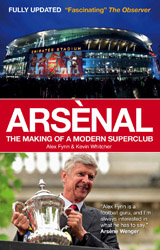A new expanded and updated version of the classic Arsenal book, ‘Arsènal: The Making of a Modern Superclub’, by Alex Fynn and Kevin Whitcher, published by Vision Sports has been released. Here is an extract from one of four new chapters, in which Arsène’s great friend David Dein talks about Arsène’s life away from Arsenal…
Putting great store on loyalty – behind his infamous ‘I did not see it’ comment was a reluctance to rebuke his players in public; a self-deprecating line which he has trotted out to good effect over the years to shield them from criticism and take the brickbats on their behalf. Yet he suffers agonies in private. David Dein observes that, “Arsène doesn’t go out when we (Arsenal) lose. When we book reservations up the road, the restaurant knows that if we’ve lost the game, it’s cancelled automatically. So they look at the results and cancel the table. Because (as Dein has learned from past experience) it’s not a dialogue, it’s a monologue. When we speak to him he doesn’t answer, because he’s in his own world. It hurts and it does still hurt, and that’s why he’s a good manager.”
For Wenger tomorrow is another day. For retrospective analysis with Boro and a heart to heart with David and another opponent on the horizon to prepare for. However, had the 2014 FA Cup Final been lost the intensification of the cutting words and recriminations that would undoubtedly have poured down in torrents, may have persuaded him, ca suffit, enough is enough. With upheaval on the domestic front, Arsenal, always the centerpiece of his life, had come to dominate it as never before in the last year or two. Alone for the most part in a high gated residence 300 yards from the old family home in Totteridge, he leads a Spartan and for the most part solitary existence. Waking up at 6.30 he will work out in his gym for 45 minutes and in the evening go for a run or a bike ride. In between he will do what he loves best. The first piece of kit he puts on is his stopwatch, then it’s out onto the training pitch with his charges. As David Dein says, “Arsène is captive to football. He’s a prisoner of his own making. He’s the most professional, most dedicated, most intelligent manager I have ever met.”
Dein also points out that the best second hand car to buy, if you can afford a top of the range Merc or Lexus, would be Arsène Wenger’s because it hasn’t been anywhere. More precisely, apart from the occasional trip to the Emirates, it goes to London Colney and back. 20 minutes there in the morning and 30 minutes back with the rush hour traffic and then the driver is home for the rest of the day, with hours of televised football to look forward to. He is more likely to be seen in the local supermarket than in a West End nightspot and when spotted will cheerfully chat, sign an autograph and pose for a photo. Nights out are not a priority, once a month – invariably to fulfil a charity or sponsors' request – would probably be his limit, David Dein having long since given up trying to persuade his friend to accompany him to the theatre, Dein's other great passion in life.
When he first met Arsène Wenger, David Dein was immediately struck by the thought, 'Arsène for Arsenal'. The club's future was written in the stars. It was destiny. But even he could not have envisaged that his beloved Arsenal would turn out to be Arsène's life work. Indeed, it may not have happened at all.
‘Arsènal: The Making of a Modern Superclub’, was last updated in 2011, and a revised version, with four new chapters, has been published to take account of the five years since including the two FA Cup trophies. It is available to Gooner readers from the publisher’s website for £5.99 if you enter the code ‘AW’ on the checkout page.










